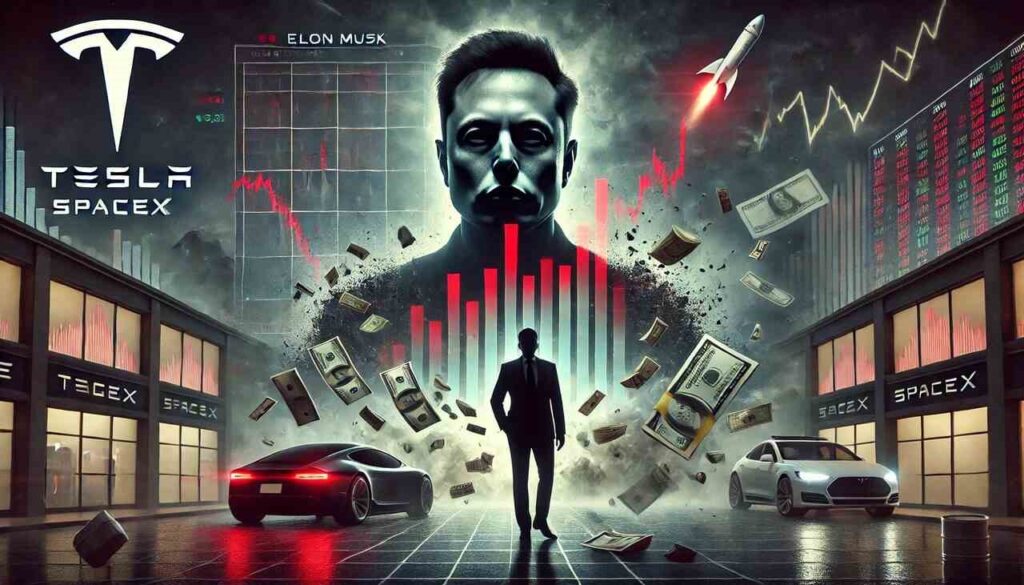How Did Elon Musk Lose Over $100 Billion in Just Four Months?
Elon Musk’s net worth declined by over $100 billion between December 2024 and April 2025 due to sharp devaluations in Tesla’s market cap, declining investor confidence, and falling tech stock valuations. The Forbes Real-Time Billionaires Index now ranks Musk as the sixth-richest individual globally, reflecting the most significant quarterly drop in his personal fortune since late 2022.
What Triggered the Massive Decline in Elon Musk’s Net Worth?
The largest contributors to Musk’s financial losses include Tesla’s plunging share price, underperformance of X (formerly Twitter), and broader market contraction in high-growth equities.
• Tesla Stock Crash: Tesla’s stock fell nearly 34% over four months, wiping out over $250 billion in market capitalization. Investor sentiment weakened due to falling electric vehicle (EV) demand, fierce Chinese competition (e.g., BYD, NIO), and regulatory pressures from the EU and U.S.
• X Platform Monetization Issues: Musk’s $44 billion acquisition of Twitter has not yielded expected ROI. Ad revenues remain below pre-acquisition levels, and premium subscription models have failed to gain traction, depressing the platform’s valuation.
• Reduced Institutional Investment: Hedge funds and large institutions divested Tesla and SpaceX-related assets due to concerns over governance, leadership distraction, and macroeconomic volatility.
• Interest Rate Pressures: The U.S. Federal Reserve’s continuation of high interest rates impacted speculative tech investments. Capital shifted to safer bonds and defensive sectors, pulling liquidity out of growth-driven assets like Musk’s holdings.
• Brand Perception Volatility: Musk’s personal political commentary and controversial posts on X contributed to reputational risk that spilled over into Tesla and SpaceX investor sentiment.
What Impact Did Tesla’s Decline Have on Musk’s Financial Portfolio?
Tesla remains the anchor of Musk’s net worth, with over 60% of his fortune tied to the automaker through stock and options.
• Share Depreciation: Musk holds approximately 13% of Tesla stock, and a 34% decline in price reduced his paper wealth by nearly $70 billion.
• Option Revaluation: Several of Musk’s performance-based stock options, tied to specific market cap milestones, are now underwater or delayed due to Tesla’s reduced valuation.
• Margin Loan Risk Exposure: Musk pledged a portion of Tesla shares as collateral for personal loans, and falling share prices increased margin call risks, forcing strategic divestments.
• Global EV Demand Drop: Tesla faced a global slowdown in EV sales, especially in Europe and Asia, as consumer subsidies declined and supply chains struggled with inflation.
• Manufacturing Bottlenecks: Issues in Tesla’s Giga Berlin and Austin facilities reduced delivery volumes, prompting analysts to revise downward earnings expectations.
How Are Musk’s Other Ventures Performing Amid the Downturn?
Musk’s other companies—SpaceX, Neuralink, and The Boring Company—have retained private valuations, but face uncertain public market expectations.
• SpaceX Valuation Plateau: SpaceX remains valued around $180 billion but faces rising costs in Starlink deployments and delayed timelines for Mars-bound missions, which challenge long-term profitability.
• Neuralink Regulatory Barriers: Neuralink has not cleared key FDA approvals for widespread human testing, creating bottlenecks in investor enthusiasm and delaying commercial application.
• The Boring Company Project Delays: Key tunnel infrastructure projects in Las Vegas and California are behind schedule, limiting revenue flow and reducing confidence in municipal partnerships.
• AI Startup Distractions: Musk’s AI startup xAI, launched to rival OpenAI, is still in pre-revenue stage, diverting time and resources while failing to deliver monetizable breakthroughs.
• Cross-Venture Management Strain: Critics suggest that Musk’s multitasking across ventures compromises operational focus, impacting execution timelines and investor trust.
What Does This Downturn Reveal About Wealth Volatility Among Billionaires?
Elon Musk’s wealth drop exemplifies the high-risk, high-volatility nature of founder-based billionaire portfolios, especially in innovation-driven sectors.
• Concentration Risk: Unlike diversified billionaires with cross-sector assets, Musk’s wealth is tightly concentrated in a few high-tech companies, making it more susceptible to sharp market swings.
• Public Perception Sensitivity: Social media behavior, political statements, and leadership tone can directly impact stock performance, especially when founders double as brand symbols.
• Market Overcorrection Dynamics: Analysts view the drop as a partial correction after years of hypergrowth in Musk’s companies, which previously traded at premium forward multiples.
• Capital Flight from Tech: The shift from growth to value investing in current markets reduces capital availability for innovation-heavy firms, increasing pressure on founder-led entities.
• Signal to Investors: Musk’s decline reinforces the importance of portfolio diversification and corporate governance stability in preserving long-term wealth resilience.
For more exciting news articles you can visit our blog royalsprinter.com

